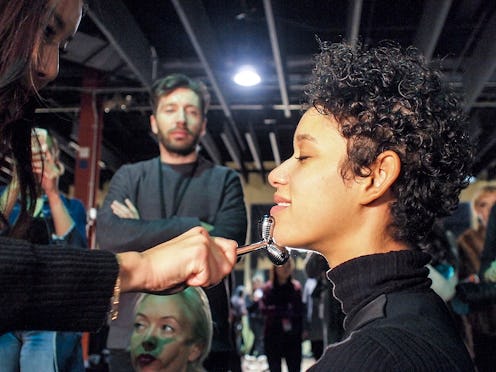(Beauty)
Would You Take A DNA Test If It Could Lead To Better Skin?

With all due respect to 23andMe, genealogy tests aren't just for tracing your roots. DNA testing for skincare is the latest and greatest way to hone in on your skincare concerns and create a more targeted personal routine, cutting back on the trial and error that comes with trying new products.
Unlike the genealogy assessments, most of these tests — like the one from Skintelli — assess eight core indicator: collagen quality, elasticity, pigmentation, sensitivity, moisture retention, sun protection, anti-oxidation, and rejuvenation. “It’s believed that out of the 30,000 genes we possess, about 1,500 may have an impact on our skin or the way our skin responds to stressors," Dr. Richard Firshein, D.O., founder of the Firshein Center for Integrative Medicine in New York City, explains. This includes photo-aging (exposure to the sun), and changes in skin texture and elasticity (which account for problems like cellulite or stretch marks). Some examples of genes that affect the ability of your skin to respond to stressors include PNF Alpha — which is responsible for inflammation, PPAGRG, which decides how you respond to collagen breakdown, and MMP3, which is responsible for premature wrinkles,” he says via email.
“From one DNA test, you might learn that you have a higher risk of collagen degradation as you age, for example, and can take an active approach to your skincare routine to prevent or slow down the risks," Dr. Neal Kitchen, the chief geneticist at HydroPeptide, tells The Zoe Report. He notes that new companies like Skintelli are trying to develop next generation sequencing of the DNA that also looks at epigenetic markers to better determine the current state of skin and how it is impacting the aging process.
And while most of these tests are done in doctor's offices and laboratories, more beauty companies are following suit with at-home options. These tests are used for analyzing and interpreting the raw data from DNA tests provided by customers to understand best how DNA may impact health, including the skin. Most require an extraction from the area inside the lip or inside the cheek. Afterwards, samples of blood, hair, skin, or any other body fluid that contain genetic material are taken in and shipped off to a lab for analysis.
Even though DNA-informed personalized skincare is in its infancy, Dr. Firshein notes that it's an exciting time for the industry. By understanding the technical advantages and consumer appeal of such comprehensive, customized testing, he explains, “we can create specific programs for each patient.” After examining your genes, the real personalization of your skincare routine begins based on the skincare problems you’re most prone to, including premature aging, inflamed skin (which leads to acne), and even rosacea. Once developed, a unique DNA-informed routine features a whole new regimen to use for your skin in the morning and evening.
Dr. Firshein tells TZR that he likes to keep it simple with morning and night creams. And as with any approach, the external needs to be complemented internally, too — care of supplements. “It’s important to remember that it’s not enough to realize you have these genes," he says. "After all, a gene-aware skincare routine will never replace the importance of monitoring your skin’s exposure to harsh environmental factors. I created exclusive products for the Firshein Center based on Swish technology and is labeled under my brand called ELEMENT. These products are derived specifically from your genetic information and a questionnaire that complements a DNA test."
Dietary habits are also key in making sure that your personalized routine actually works, too. “I would argue the main focus of your skincare routine should be an optimized diet. Eating the right kind of foods and providing the best nutrients to the body impact our health inside and out,” Dr. Kitchen explains. “Our skin can often be a diagnostic readout of our overall health. So you can’t just blame your genes for the success or failure of your skincare routine,” he adds.
If you're not ready to commit to a test, there are still tweaks that you can make to your existing routine. Ahead, see the supplements and "intelligent" skincare picks that experts love. Cotton swab not included.
Shop Supplements & Intelligent Skincare
This article was originally published on